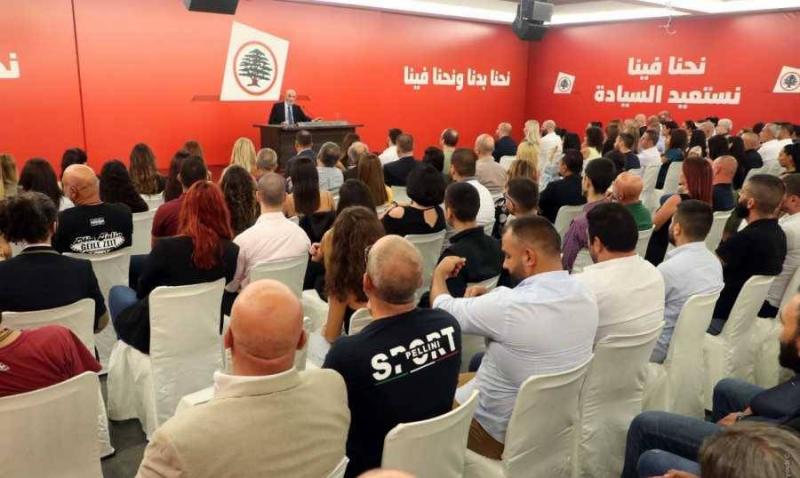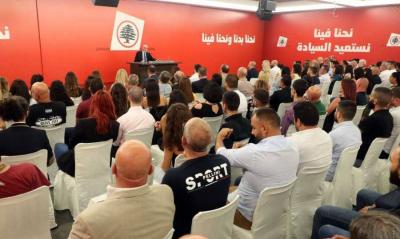Lebanese Forces Party leader Samir Geagea noted that "the most important and prominent journalists in Lebanon today write daily analyses in their articles indicating that the picture remains unclear regarding the outcome of the presidential elections because the 'key' has not yet come from abroad." However, he expressed confusion about what "key from abroad" they are referring to, stating, "This is the fifth presidential election I have closely followed, and I do not understand."
Geagea emphasized that "no one abroad cares at all whether the presidential elections in Lebanon take place or not, and if they do happen, they do not care who the new president will be. The outside world has wishes but nothing more; each country wants a president who aligns with its interests. However, how can the outside world influence this? The Iranians can affect this timeline through Hezbollah, which holds the parliamentary bloc. As for other countries, how can they influence it? From this perspective, the determining factor in the presidential elections is the local parties, and only Iran among foreign countries can influence this exclusively through Hezbollah. Even if the party had only two deputies, its influence would equal that of just two deputies."
Geagea shared these remarks during a meeting at the Lebanese Forces Party's headquarters in Maarab with a group of party activists, alongside the head of the Political Formation Department, Charbel Eid, and several staff members.
He urged the Lebanese people not to heed these theories, stating, "There are many theories that need to be removed from the discourse. For example, some claim that deciding on the presidential election is pending the results of the Vienna talks, impacting it. I do not understand the connection between the Vienna talks, which revolve solely around the nuclear file, and the presidential elections in Lebanon. I challenge anyone to explain this connection, as I do not see it anywhere. We are indeed living under 'political myths' since the only influences on the course of the presidential elections are the will of the local parties, who are unfortunately experiencing a state of confusion today."
He explained that "the situation is difficult, yet there is still something that can be done. The only thing I can say at the moment is that it has become probable that a president from the 'March 8' alliance will not reach the presidency. This can be considered 50% of the mission. The remaining half lies in producing a president capable of confronting, standing firm with his principles and beliefs, and capable of taking even minimal decisions. If we do not elect such a president, matters will not change, as it is not enough for the president-elect to simply refrain from doing what the other team wants while having the structures within institutions that guarantee the execution of their demands. From here, we demand a president who ‘can hold his own’ and takes the initiative to dismantle these structures and reverse the course of affairs."
Geagea continued, "We are facing three tough months ahead, and the question remains whether we will be able to elect a minimally acceptable president, one who can make certain decisions, is sovereign-minded, reform-oriented, and of good moral character. Because bringing in a colorless, flavorless president merely to inhabit the Baabda Palace, who ultimately does nothing, is tantamount to electing someone who achieved nothing at all."
On another note, Geagea addressed the slogan "We want and we can," stating, "Many people say today that we based our electoral campaign on this slogan, but once the elections concluded, it became clear that 'if you want, you can't.' Hence, I want to emphasize that we are entirely serious in our assertion of this slogan. Furthermore, I want to clarify that it is an electoral campaign slogan, not our electoral program, which consisted of 30 pages that we distributed to everyone in three languages, detailing all intended measures across various sectors, such as education, health, and defense. Therefore, the slogan 'We want and we can' is merely a declaration of intentions."
He highlighted that "six or seven months before the parliamentary elections, despair was widespread in the country, and I would hear the same question hundreds of times daily about whether anything could still be done, as it seemed the situation was heading towards deterioration with Hezbollah holding the majority. At that time, the biggest diplomatic circles in the world believed that the parliamentary elections would not bring about the necessary change, and the prevailing public opinion indicated that the majority would remain with Hezbollah, resulting in only a slight change of three or four seats in favor of the Lebanese Forces, while everything else would remain the same. Hence, there was a need to boost morale on one hand, while simultaneously declaring our intentions that 'we want and we can.' We possess the necessary resources. Even now, I am very serious in stating this slogan, but as for 'we can,' this does not mean 'due to circumstances,' as we are not in the United States where an entire team wins and another loses. So yes, 'we want' has always been our intention since the establishment of the Lebanese Forces Party, and we have a proud and clean history. Regarding 'we can,' we fight daily battles and confrontations to see how we can."
He continued, "We must not forget that we are working with tools that are not our own. Everyone can see what we are capable of in places where we have our resources, whether in ministries we have taken over or specifically in the Bsharri area, where we hold all parliamentary seats, the municipal union, the majority of municipal councils, and the mayorships. We have been able over the past 17 years to completely transform it, demonstrating that where we have all the tools, 'we want and we can.' In places where we do not possess all the tools, naturally we 'want' and strive daily to see 'how we can.'"
Geagea insisted that "this declaration of intent was essential at the time and continues to be necessary today to maintain hope among people that someone is working for Lebanon. This slogan means we are here and working for the country to the extent and degree you have given us, and the more you give us, the more we can work."
He began his speech by stating, "You are 'children of a cause' in every sense of the word. You work and strive day and night without any compensation to contribute to facing what we are up against today. In this regard, I want to remind everyone that you are not the only ones who 'do not sleep,' but also 'the guardians who do not sleep and will not sleep.'"
Geagea noted, "We are not a party in the traditional sense of the word, but we are much more than that. Circumstances have placed us here in this wild and continuously explosive region of the Middle East, which will remain thus until further notice. In comparable areas, society needs a backbone to rely on, and in our community, this backbone is the Lebanese Forces Party."
He emphasized that "as children of a cause, we must demonstrate effective party work through our performance, thereby changing the general perception of parties, which has been shaped by the actions of some other parties in Lebanon. And you must remember well that you are not exerting effort to receive anything in return; rather, you are doing it for the community because our fathers, grandfathers, and ancestors are embodied in us, and when we breathe, they breathe with us."




